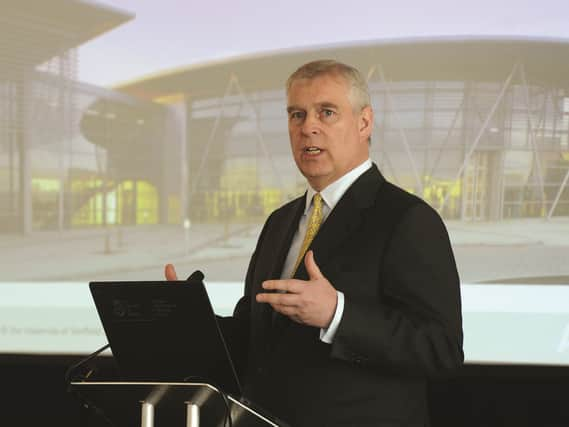Royal approval for futuristic factory


The £43 million centre, part of the Advanced Manufacturing Research Centre, helps firms test new production methods.
The Duke (pictured) was shown how work there is enabling robots to accurately machine holes in aircraft parts, a project set to save BAE Systems millions of pounds.
Advertisement
Hide AdAdvertisement
Hide AdHe said: “The AMRC is a very important part of the UK’s industrial landscape.
“It has developed over the last 15 to 20 years from a gleam in the eye and is now at the forefront of research in a whole range of areas.
“I would like to congratulate everyone who has done such a lot to build what is a world class establishment doing some fantastic research.
“I’ve watched the AMRC grow over the years, I’ve even opened one or two of its buildings, so it’s a great pleasure to be officially opening Factory 2050.”
Advertisement
Hide AdAdvertisement
Hide AdThe Duke of York previously carried out the same duties at the AMRC Rolls-Royce Factory of the Future in 2008 and the AMRC Training Centre in 2014.
Prof Keith Ridgway, AMRC executive dean, said: “Factory 2050 will keep us at the forefront of manufacturing technology and is a beacon for the region, hopefully attracting young people to careers in manufacturing.
“It is an absolute honour to welcome HRH The Duke of York to officially open this exceptional facility.”
Ben Morgan, head of the AMRC’s integrated manufacturing group, said: “The work taking place at Factory 2050 is at the cutting edge of manufacturing research and we’re extremely privileged to be able to demonstrate this to The Duke on his visit here today.”
Advertisement
Hide AdAdvertisement
Hide AdProf Shearer West, the University of Sheffield’s provost and deputy vice chancellor, said: “Factory 2050’s landmark building complements the state-of-the-art technology within, which will help to further revolutionise the UK’s manufacturing sector.”
Teams at Factory 2050 are working with manufacturing partners on projects spanning robotics, automation and digitally-assisted assembly.
Their work will help to develop ways of meeting demand for high variation and mass customisation.
Factory 2050 was part funded by the European Regional Development Fund and the Higher Education Funding Council for England.